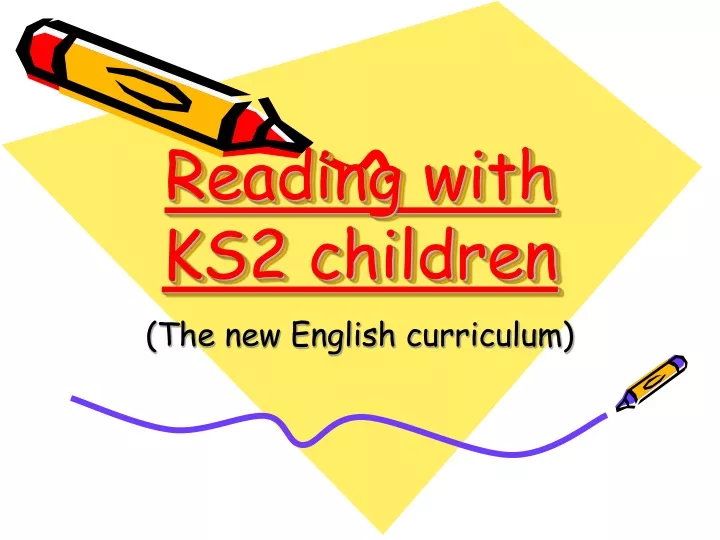

Reading with KS2 children
Jan 03, 2020
200 likes | 261 Views
Reading with KS2 children. (The new English curriculum). Reading at home. In order for children to be able to access all areas of the curriculum, we would like parents to work with us to encourage happy, fluent readers.
Share Presentation
- english curriculum
- reading reading
- word reading
- reading book encourage
- higher order reading skills

Presentation Transcript
Reading with KS2 children (The new English curriculum)
Reading at home In order for children to be able to access all areas of the curriculum, we would like parents to work with us to encourage happy, fluent readers. Our overall aim is to teach children the process of reading ,to understand the text, to read for pleasure and to become life long readers. We very much value the support parents are able to give their children .
Why is reading so important? • an over riding aim must be to promote a life- long love of books and reading( reading for pleasure); • the ability to read fluently and with meaning develops and enhances many skills including: grammar, vocabulary, memory, imagination, knowledge of the world, attention span, self confidence, understanding and interpreting, links to other subjects including CC links
International reading study • children in England tended to report ‘reading for pleasure’ less frequently than peers in many other countries; • 23rd out of 29 countries; • only one third of children reported reading for pleasure on a daily basis outside of school;
Reading at school • independent, quiet reading for 15 minutes each day – read to teacher/TA/parent helper • reading records kept • targets given • assessed regularly • variety of CC texts- whole class, independent, group reading • reading comprehension lessons; • book reviews; • book of the term;
Reading assessment( reading trail) • assess reading for comprehension and accuracy; • do you read at home? • what strategies do you use if you are stuck on a word?-phonics/segment/read around the word • reading record;(fiction/non fiction) • do you think you are a good reader? • do you enjoy reading? • do you have a favourite author? • what type of books do you enjoy reading?
Important aspects to reading Accuracy ( word recognition) Involves decoding words by phonic and other strategies to arrive at the correct pronunciation Comprehension Involves the brain internalising decoded words, ordering them into a meaningful sequence and interpreting the grammar involved to arrive at a meaning Punctuation /expressive reading
How to help • fluent readers still need to read to an adult at least 4 times a week; • continue sharing books; • sometimes read to your child; • sometimes read with them ( aids expressive reading); • Sometimes hear your child read; • discuss book with increasing depth; • success is the key – 95% accuracy; • positive approach- enjoyable experience) 20 minutes to include 10 minutes of discussion and questioning); • to become good readers and to read with understanding children need to develop higher order reading skills;
Higher order reading skills Decoding Retrieval and recall Skimming and scanning Personal responses Inference and deduction Structure and organisation Language Purpose and viewpoint Making links Fact/opinion Self correct when meaning is lost
Questions and prompts • Questioning and discussing texts – both very important for measuring understanding and comprehension skills; • Timed , optional SATS- Y3,4,5; • SATS are designed for children to show they can read with understanding using the higher order reading skills; • Different question styles- a lot more questions on children’s own opinion on the texts; • List of questions to help;
Reluctant readers • encourage reading of books with topics that interest them; • read a series of books by the same author; • audio visual books; • fun/interactive books; • read books with fewer words; • newspapers/comics; • Barrington Stoke publishers – range of authors for reluctant readers
Life long readers • do your children see you reading? • are you enthusiastic about reading? • encourage your child to read for pleasure- visit the library/Bath Literary Festival/theatre; • encourage your child to read/share books with other adults; • story telling events; • library-summer challenge; • school library; • word games- boggle /scrabble; • talk to your children- correct grammar; • don’t feel you have to always read the reading book – encourage other texts and make it fun;
Children learn to read so that they can read to learn.
The key changes for KS2 English curriculum Reading: discussion of fiction, poetry, plays, non fiction , reference books Preparation of poems and play scripts to read out loud; The need to recognise different forms of poetry; The need to increase familiarity with a range of books;
Key changes in reading • the need to read whole texts; • a shift from word reading to comprehension; • reading for pleasure; • to make comparison between texts • reading to be encouraged as a cross curricular skill;
Key changes in writing • an increased focus on developing and improving handwriting; • a greater number of specific grammatical structures with which pupils will become familiar; • cross curricular skill;
Key changes in Spoken English • speaking and listening is now referred to as ‘spoken English’ or spoken language’; • spoken English is not separated into Key Stages; • spoken English is encouraged as a cross curricular skill; • please encourage the use of standard English;
Grammar, spelling and terminology • big focus on grammar- SPAG test • please help your child with weekly spellings • terminology is now used in grammar lessons. This is also linked to writing • please correct your child’s grammar
Parental support Many thanks for your on going support. Your support is vital in encouraging your child to read with understanding, to read for pleasure and to become life long readers. ‘Hand outs’ on the higher order reading skills and questioning children on fiction and non fiction books can be obtained from Mrs Bradley
- More by User
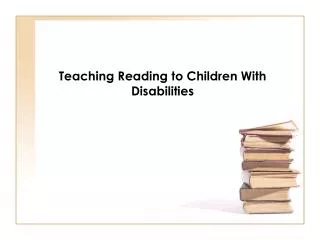
Teaching Reading to Children With Disabilities
Teaching Reading to Children With Disabilities. Did You Know That…. Only 31% of the nation’s fourth graders are proficient readers ( N ational Assessment of Education Programs, 2003). Students who fail to read on grade level by the fourth grade rarely “catch up” (Lyon, 2001).
912 views • 55 slides
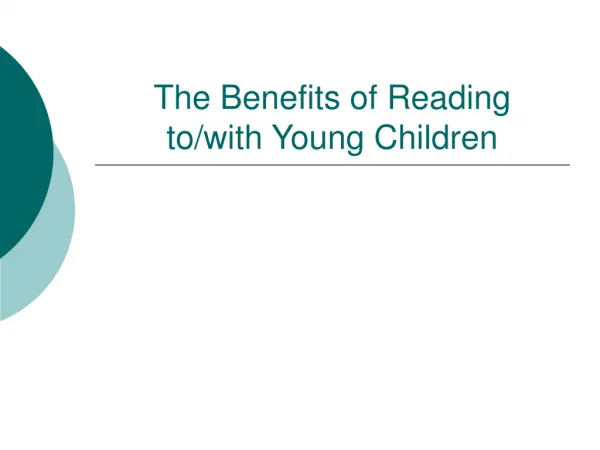
The Benefits of Reading to/with Young Children
The Benefits of Reading to/with Young Children. The Benefits of Reading to/with Young Children. Young children need time with a parent. It’s bonding time. It’s communicating time. It’s just plain fun time!. The Benefits of Reading to/with Young Children. You are raising a reader!
433 views • 6 slides

Supporting your child with their reading – KS2
Supporting your child with their reading – KS2. Evidence suggests that there is a positive relationship between reading frequency, reading enjoyment and attainment. ( Rumbold and Clarke)
767 views • 19 slides

Reading and Deaf Children
Progress. Students who are deaf or are hard-of-hearing progress at an extremely slow rateTheir gains typically take 3-4 years compared to the 1 year it takes a child without a hearing impairment. Factors. Being deaf or hard-of-hearing influences a child's development of literacyThe main difficulti
517 views • 14 slides
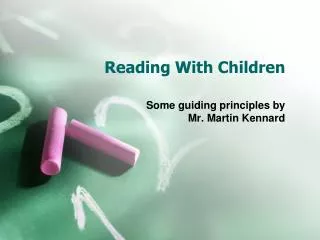
Reading With Children
Reading With Children. Some guiding principles by Mr. Martin Kennard. Location. Find a safe and comfortable place, not on the MTR on the way home from a restaurant! For younger children, the bedroom may be the best location. Preparation.
222 views • 9 slides

Guided Reading in KS2
Objectives . To look at teachers' current practice in Guided Reading sessions and the impact on pupil enjoyment and achievement.To enable teachers to continue to deliver high quality Guided Reading sessions that will have an positive impact on reading attainment.To model Guided Reading using an on
783 views • 18 slides

Reading Difficulty in Children
Reading Difficulty/Dyslexia. 4 main learning disorders according to DSM-IV:Reading disorder (i.e., dyslexia).Writing disorder (i.e., dysgraphia).Mathematical disorder (i.e., dyscalculia).Mixed learning Disorder-"NOS"Dyslexia (Derived from Greek Dys" means poor and Lexis" means language): Re
321 views • 27 slides
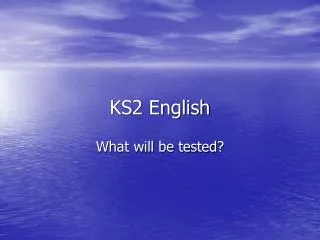

KS2 English
KS2 English. What will be tested?. The Reading Paper. Independent reading (15 minutes) Layout questions Summary questions Retrieval questions Inference questions What can you do to help? Encourage your child to read – anything at all! Listen to them read whenever possible
421 views • 16 slides
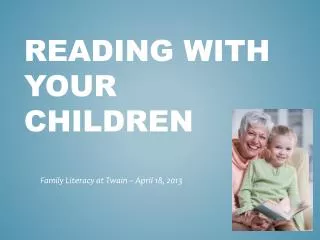
Reading with Your Children
Reading with Your Children. Family Literacy at Twain – April 18, 2013. 5:30 - 5:45– Register and Pick up a Free Book 5:45 – 6:15 - Dinner/Presentation/Survey – Cafeteria – Mrs. Ferguson & Ms. Deem 6:15 – 7:00 - Breakout sessions (Choose any 3 of the 5)
207 views • 11 slides
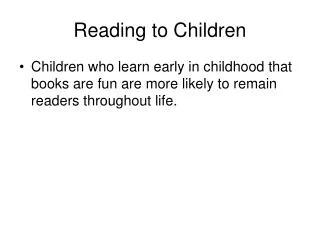
Reading to Children
Reading to Children. Children who learn early in childhood that books are fun are more likely to remain readers throughout life. Choosing Appropriate Books.
374 views • 20 slides

Reading Aloud to Children
Reading Aloud to Children. Mrs. Keruskin Mrs. Mason . Lesson Goals. Reinforce read aloud concepts (read aloud tips & techniques) Introduce those attributes of children’s picture books that make them good candidates for reading aloud Provide a variety of useful read aloud Web resources.
536 views • 15 slides
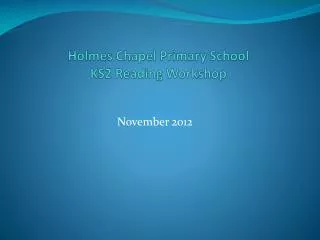
Holmes Chapel Primary School KS2 Reading Workshop
Holmes Chapel Primary School KS2 Reading Workshop. November 2012. Reading in KS2. Generally by the time children reach KS2 they are starting to become confident, fluent readers. It might seem that they ‘can read’ but this is only the beginning…. How we teach reading in school.
244 views • 14 slides

Reading with children
Reading with children. Session 1. Housekeeping!. 1. Toilets. These are located by the lifts. 2. Emergency Evacuation. Please take all your belongings. Basically, FOLLOW ME!!! Last one out shut the door!. Overview.
357 views • 22 slides
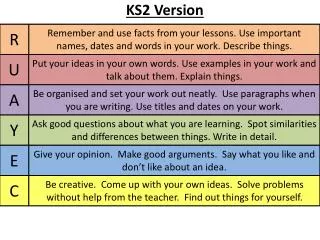
KS2 Version
R. Remember and use facts from your lessons. Use important names, dates and words in your work. Describe things. U. Put your ideas in your own words. Use examples in your work and talk about them. Explain things. KS2 Version.
177 views • 7 slides
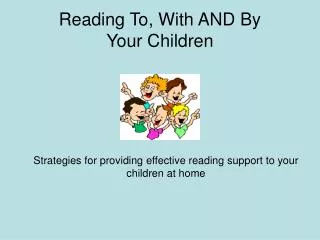
Reading To, With AND By Your Children
Reading To, With AND By Your Children. Strategies for providing effective reading support to your children at home. Yes ?????. Feel frustrated? Does your child get frustrated? Tell your child to sound it out? Tell your child not to look at the picture?
458 views • 27 slides

Reading outcomes of children with speech-language impairment:
Reading outcomes of children with speech-language impairment: Longitudinal evidence from the ECLS-K. The Early Childhood Longitudinal Study – Kindergarten Cohort (ECLS-K). An ongoing study sponsored by the U.S. Department of Education.
132 views • 1 slides

KS2. SATS TESTS Information evening for parents. Aims. To become more familiar with the KS2 test papers. To understand changes for 2014. To understand the reporting arrangements for parents. What will continue?. If a child is ill they can sit the test within the week
530 views • 36 slides

Holmes Chapel Primary School KS2 Reading Workshop. Reading in KS2. Generally by the time children reach KS2 they are starting to become confident, fluent readers. It might seem that they ‘can read’ but this is only the beginning…. How we teach reading in school. Shared reading (whole class)
267 views • 13 slides
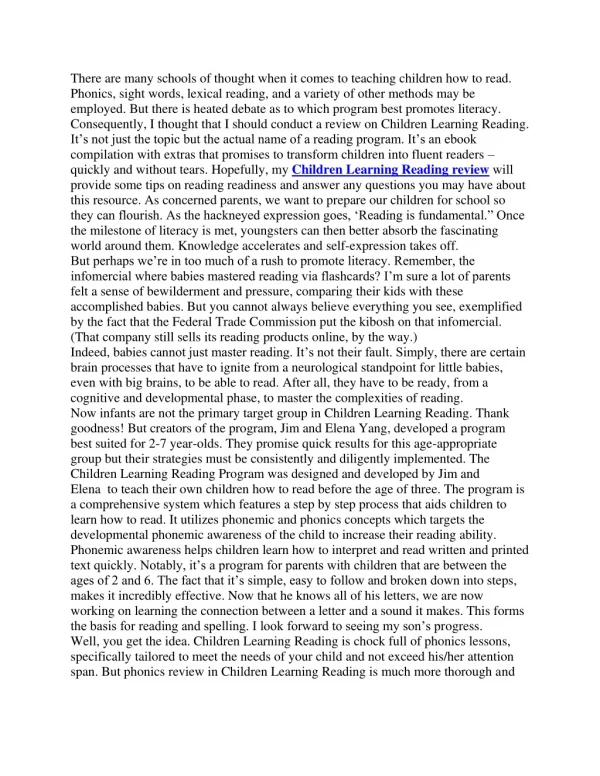
Children learning reading
50 views • 3 slides
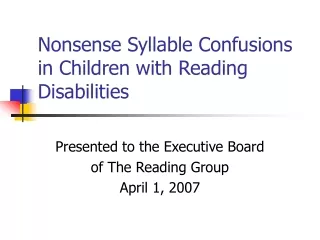
Nonsense Syllable Confusions in Children with Reading Disabilities
Nonsense Syllable Confusions in Children with Reading Disabilities. Presented to the Executive Board of The Reading Group April 1, 2007. University of Illinois at Urbana-Champaign. Dr. Cynthia J. Johnson , presenting Dr. Jont Allen 1 and Dr. Cynthia J. Johnson 2 , Primary Investigators
409 views • 39 slides
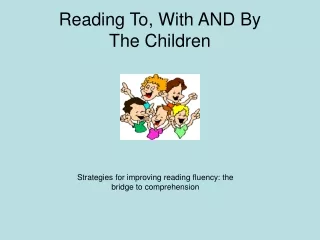
Reading To, With AND By The Children
Reading To, With AND By The Children. Strategies for improving reading fluency: the bridge to comprehension. Recent studies on high frequency words (sight words):.
159 views • 14 slides

83 views • 6 slides

IMAGES
VIDEO